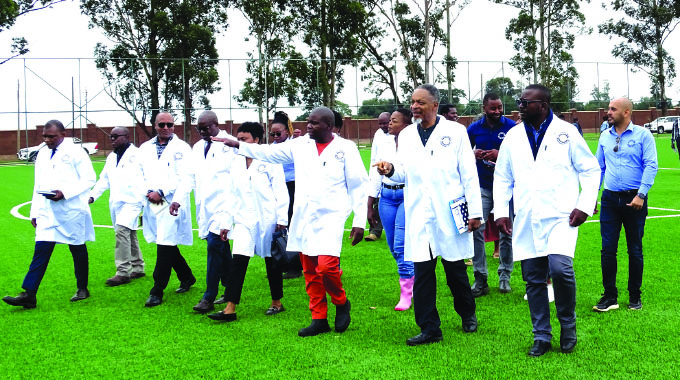UN to increase cooperation with Geo-Pomona

Wallace Ruzvidzo Herald Reporter
The United Nations (UN) has said it will increase its cooperation with Geo Pomona Waste Management company to ensure the timely attainment of Sustainable Development Goals (SDGs).
This comes after a UN delegation on Friday toured the waste management firm’s dumpsite and registered satisfaction with progress made thus far.
UNICEF’s representative ad interim, Dr Nicholas Alipui, said such projects were pivotal in the attainment of SDGs globally.
He said the transformation at the site was spearheading the realisation of at least six SDGs, something which was impressive.
“Last year we had an international summit in stocktaking of the Sustainable Development Goals which were launched in September 2015 and, shockingly for the world, we were not on track to achieve 15 of the 17 SDGs, which is a setback.
“This project here seems to represent that form of transition which will make it possible for us to impact the health of people, economic activity and the quality of life and livelihoods of people as well as create jobs for people, so this speaks to a number of SDGs.
“On an easy count, one can talk about six or seven SDGs that will be impacted by the type of transformation that is happening here,” he said.
Dr Alipui said the UN had been “impressed” by the work being done by Geo Pomona Waste Management company, adding that the bloc hoped that more such projects would be rolled out countrywide as well as on the continent at large.
“We are impressed, for the short period within which the transformations happened we were able to appreciate the before and after situation.
“We saw how almost impossible the road here was, the mountains and heaps of urban waste accumulated over 15 or 20 years before the transformation happened and we have also been able to witness how within a period of two years it was possible to completely transform the situation with a plan to create social amenities. We have seen basketball courts, tennis courts and a football field that’s certified by FIFA and we have seen construction for the sorting of wastewater treatment and all kinds of other projects.
“Our hope is, with the kind of change we are seeing, it should be possible to replicate this project in other municipalities and cities of the country as well as expand the outreach to other parts of our continent,” he said.
The UN representative added that the project was an international best practice.
“We have come out to witness first hand a transformative, absolutely impressive project here in Pomona, where we are seeing how an insurmountable problem of waste management has been transformed into a development project that is of interest to the community and country at large. I think internationally, it’s a best practice that one can really highlight for Zimbabwe,” he said.
Geo Pomona Waste Management’s executive chairman and chief executive officer, Mr Dilesh Nguwaya, said a Memorandum of Understanding with the UN was on the cards.
“They said we are going to have a memorandum of understanding very soon to make sure that we combat climate change and the United Nations wants us to collaborate with other cities internationally and regionally,” he said.
Mr Nguwaya said the UN delegation had been shocked by the speed at which progress was being made at the dump site.
“They said we have done well in the shortest period we took over from the City of Harare. It has only been two years and nine months but they were shocked with the work which has been done here.
“The progress which has been made here, as you can see, is the construction of the road, streetlights to make sure people can come and dump waste 24 hours a day, the construction of sports facilities, sorting plant and hazardous waste and also the water treatment plant,” he said.








Comments